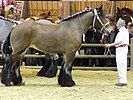Wikipedia:Today's featured article/February 2015
| << | Today's featured articles for February 2015 | >> | ||||
|---|---|---|---|---|---|---|
| Su | Mo | Tu | We | Th | Fr | Sa |
| 1 | 2 | 3 | 4 | 5 | 6 | 7 |
| 8 | 9 | 10 | 11 | 12 | 13 | 14 |
| 15 | 16 | 17 | 18 | 19 | 20 | 21 |
| 22 | 23 | 24 | 25 | 26 | 27 | 28 |
February 1
Przevalski's nuthatch (Sitta przewalskii) is a bird species in the family Sittidae. Long regarded as a subspecies of the white-cheeked nuthatch (Sitta leucopsis), it nevertheless differs significantly in morphology and vocalizations. It is a medium-sized nuthatch, measuring about 13 cm (5.1 in) in length. Its upper body is a dark gray-blue. The cheeks and throat are a white buff-orange, turning to a rich cinnamon on the underparts. The bird is endemic to areas in southeastern Tibet and west central China, inhabiting coniferous mountain forests. The species was first described in 1891 from a specimen collected in China's Haidong Prefecture. The name commemorates the Russian explorer Nikolay Przhevalsky, who discovered the species in 1884. Little is known about its ecology. It was awarded the rank of full species in 2005, separating it from the white-cheeked nuthatch. As of 2014, S. przewalskii does not have a full threat-status evaluation by BirdLife International or the IUCN. A 2014 phylogenetic study found the species to be at the base of the nuthatch evolutionary tree, dispelling a hypothesis that S. przewalskii could belong to the same species as S. carolinensis. (Full article...)
Recently featured: Lambertia formosa – Battle of Öland – Lanny McDonald
February 2
Philip Seymour Hoffman (1967–2014) was an American actor, director, and producer of film and theater. Best known for his character roles – typically lowlifes, bullies, and misfits – Hoffman gained recognition for his supporting work in films like Boogie Nights (1997), Happiness (1998), and The Talented Mr. Ripley (1999). For his portrayal of the author Truman Capote in Capote (2005), he won multiple accolades including the Academy Award for Best Actor. Three more Oscar nominations came for his performances in Charlie Wilson's War (2007), Doubt (2008), and The Master (2012). While he mainly worked in independent films, including The Savages (2007) and Synecdoche, New York (2008), Hoffman also appeared in Hollywood blockbusters, such as Mission: Impossible III (2006) and The Hunger Games (2013–2015). He was an accomplished theater actor and director: his performances in three Broadway plays all led to Tony Award nominations. Hoffman died in February 2014, of combined drug intoxication, at age 46. He is remembered for his fearlessness in playing reprehensible characters, and for bringing depth and humanity to such roles. (Full article...)
Recently featured: Przevalski's nuthatch – Lambertia formosa – Battle of Öland
February 3
State Route 67 (SR 67) is a state highway in San Diego County, California. It begins at Interstate 8 in El Cajon and continues to Lakeside as the San Vicente Freeway before becoming an undivided highway through the eastern part of Poway. The route ends in Ramona at SR 78 west of Julian. SR 67 provides direct access from the city of San Diego to the East County region of San Diego County. Julian was accessible from San Diego by stagecoach in 1872, and by railroad (to Foster) and stagecoach in 1896. A highway known as the Julian road was built by 1913, and was designated as Legislative Route 198 in the state highway system by 1935. This route was renumbered SR 67 in the 1964 state highway renumbering. A freeway south of Lakeside was built in the late 1960s and opened to traffic in 1970. Since then, the undivided portion of the highway north of Lakeside has become known for a high number of traffic accidents and fatalities. The California Department of Transportation has made several attempts to make the road safer. (Full article...)
Recently featured: Philip Seymour Hoffman – Przevalski's nuthatch – Lambertia formosa
February 4
"Damien" is the tenth episode of the first season of the animated television series South Park. It originally aired on Comedy Central in the U.S. on February 4, 1998. In the episode, Damien is sent by his father Satan to find Jesus and arrange a boxing match between the two. Most South Park residents bet on the muscular Satan to win, but he throws the fight to win their money. Directed by Trey Parker (pictured) and written by Parker, Matt Stone and Dave Polsky, the episode satirizes religion, commercialism and the cult of celebrity. "Damien" received generally positive reviews and was the highest rated cable program the week it aired, viewed by 3.2 million households. The episode marked the first appearance of Satan, who would become a recurring South Park character, as well as the character of Damien, inspired by the antagonist of the 1976 horror film, The Omen. Parker and Stone said the episode introduced several key characteristics of the Cartman character that have endured throughout the series. Michael Buffer, the boxing ring announcer best known for the catchphrase "Let's get ready to rumble!", makes a guest appearance in "Damien" as himself. (Full article...)
Recently featured: California State Route 67 – Philip Seymour Hoffman – Przevalski's nuthatch
February 5
Marcus Ward Lyon, Jr. (1875–1942) was an American mammalogist, bacteriologist, and pathologist. Born into a military family, he demonstrated an early interest in zoology by collecting local wildlife around his father's army posts. He graduated from Brown University in 1897, and continued his studies at George Washington University while working part-time at the United States National Museum. He received his Ph.D. in 1913. Lyon published many papers on mammalogy, formally describing six species, three genera, and one family. In 1919, he and his wife Martha moved to South Bend, Indiana, to join a newly opened clinic. He began to publish medical studies too, but continued his work in mammalogy, with a particular focus on the local fauna of Indiana. He published more than 160 papers during his career. Lyon acquired the rank of major in the Medical Reserve Corps during World War I, and was appointed president of the American Society of Mammalogists from 1931 to 1932. He was a member of Sigma Xi, the Society of American Bacteriologists, the Indiana Academy of Science, and the Biological Society of Washington. Lyon became a conservationist later in life. (Full article...)
Recently featured: "Damien" (South Park) – California State Route 67 – Philip Seymour Hoffman
February 6
Female genital mutilation (FGM) is the ritual removal of some or all of the external female genitalia. Typically conducted by a traditional circumciser using a razor blade or knife (with or without anaesthesia), FGM is concentrated in 27 African countries, Yemen and Iraqi Kurdistan, and is also found elsewhere in Asia, the Middle East and among diaspora communities around the world. The procedures take place from within days of birth to puberty, and include removal of the clitoral glans, removal of the inner labia and, in the most severe form, removal of the inner and outer labia and closure of the vulva. In this last procedure, a small hole is left for the passage of urine and menstrual blood, and the vagina is opened for intercourse and childbirth. Health effects can include infections, cysts, childbirth complications and fatal bleeding. Over 130 million women and girls have undergone FGM in the 29 countries in which it is concentrated. Rooted in gender inequality, ideas about female purity and attempts to control women's sexuality, the practice is usually initiated and carried out by women, who fear that failing to have their daughters and granddaughters cut will expose the girls to social exclusion. (Full article...)
Recently featured: Marcus Ward Lyon, Jr. – "Damien" (South Park) – California State Route 67
February 7
Jesus nahm zu sich die Zwölfe (Jesus gathered the Twelve to Himself), BWV 22, is a church cantata by Johann Sebastian Bach, written for the last Sunday before Lent. He composed it as an audition piece for the position of director of church music in Leipzig, and first performed it in a church service there at St. Thomas (pictured) on 7 February 1723. The work begins with a scene from the Gospels in which Jesus predicts his suffering in Jerusalem. The unknown poet of the cantata text took the scene as a starting point for reflections in which the contemporary Christian takes the place of the disciples who do not understand what Jesus is telling them. The closing chorale is a stanza from Elisabeth Cruciger's "Herr Christ, der einig Gotts Sohn". The work, structured in five movements, shows that Bach had mastered the composition of a dramatic scene, an expressive aria with obbligato oboe, a recitative with strings, an exuberant dance, and a chorale in the style of Johann Kuhnau, his predecessor in Leipzig. According to the Bach scholar Richard D. P. Jones, elements such as a "frame of biblical text and chorale around the operatic forms of aria and recitative" became standards for Bach's Leipzig cantatas and even his Passions. (Full article...)
Recently featured: Female genital mutilation – Marcus Ward Lyon, Jr. – "Damien" (South Park)
February 8
The Trait du Nord is a breed of heavy draft horse developed in the area of Hainaut in western Belgium and in northeastern France. Originating in the fertile Flemish grasslands, it was bred for size and pulling power for agricultural work. Horses of the breed are considered to be gentle and easy to handle. They have many colors, although bay and roan are the most common. Originally considered a subtype of the Ardennes horse, it was recognized as an individual breed with the opening of a studbook in 1903. The Trait du Nord was used extensively in mining from the late 19th century through 1920 (and occasionally through the 1960s), and in agriculture through World War II. During the mid-20th century, the breed was in demand for the production of horse meat, but this demand began to decline by the early 1970s, and the Trait du Nord, like many European draft breeds, was in danger of extinction. In the 1990s the breed experienced a slight revival through an increased interest in recreational riding and driving, but it is still considered to be endangered by the French government, with a high risk of inbreeding: there are fewer than 100 new foal births a year. The national breed registry in France is working with local groups to reverse the decline. (Full article...)
Recently featured: Jesus nahm zu sich die Zwölfe, BWV 22 – Female genital mutilation – Marcus Ward Lyon, Jr.
February 9
Æthelred was King of Mercia from 675 until 704. He was the son of Penda of Mercia and came to the throne in 675, when his brother, Wulfhere of Mercia, died. Within a year of his accession he invaded Kent, where his armies destroyed the city of Rochester. In 679 he defeated his brother-in-law, Ecgfrith of Northumbria, at the Battle of the Trent in a major setback for the Northumbrians; it effectively ended their military involvement in English affairs south of the Humber and permanently returned the kingdom of Lindsey to Mercia's possession. Nevertheless, Æthelred was unable to re-establish his predecessors' domination of southern Britain. He was known as a pious king, and he made many grants of land to the church. His wife, Osthryth, was a daughter of King Oswiu, one of the dominant 7th-century Northumbrian kings. Osthryth was murdered in unknown circumstances in 697, and in 704 Æthelred abdicated, leaving the throne to Wulfhere's son Coenred. Æthelred became a monk at Bardney, a monastery which he had founded with his wife, and was buried there. His son Ceolred became king after Coenred; it is also possible that Æthelred had another son named Ceolwald who was briefly king before Ceolred. (Full article...)
Recently featured: Trait du Nord – Jesus nahm zu sich die Zwölfe, BWV 22 – Female genital mutilation
February 10
The wordless novel uses captionless pictures to tell a story, most often using woodcut and other relief printing techniques. The genre flourished primarily in the 1920s and 1930s, especially in Germany. The typically socialist work drew inspiration from medieval woodcuts and used the awkward look of that medium to express angst and frustration at social injustice. The first such book was the Belgian Frans Masereel's 25 Images of a Man's Passion (illustrated), published in 1918. Other artists, such as the German Otto Nückel, followed Masereel's example. Lynd Ward brought the genre to the United States in 1929 when he produced Gods' Man, which inspired other American wordless novels and was parodied in 1930 by cartoonist Milt Gross in He Done Her Wrong. Following an early-1930s peak in production and popularity, the genre waned in the face of competition from sound films and anti-socialist censorship in Nazi Germany and the US. The graphic novels of cartoonists Will Eisner and Art Spiegelman and the wordless graphic novels of Eric Drooker and Peter Kuper were inspired by the wordless novel genre. (Full article...)
Recently featured: Æthelred of Mercia – Trait du Nord – Jesus nahm zu sich die Zwölfe, BWV 22
February 11
Final Fantasy VIII is a role-playing video game released for the PlayStation in 1999 and Windows in 2000. It was developed and published by Square as the Final Fantasy series' eighth title, the first title to consistently use realistically proportioned characters. The game follows a group who have joined the "SeeD" mercenaries and are trying to stop Ultimecia, a sorceress from the future, from casting a spell that compresses time. Playable characters include the duty-bound loner Squall, the outspoken and passionate young woman Rinoa, the patient instructor Quistis, the martial artist Zell, the cheerful airship pilot Selphie, and Irvine, a marksman looking for love. The music was scored by Nobuo Uematsu, a series regular, and in a first for the series, the theme music is a vocal piece, "Eyes on Me", performed by Faye Wong. The game was a commercial success and positively received by critics. Thirteen weeks after its release, it had earned more than US$50 million in sales, making it the fastest-selling Final Fantasy title before Final Fantasy XIII, a multi-platform release. The game had shipped 8.15 million copies worldwide by the second quarter of 2003. (Full article...)
Part of the Final Fantasy VIII featured topic.
Recently featured: Wordless novel – Æthelred of Mercia – Trait du Nord
February 12
The "Streatham" portrait is an oil painting on panel from the 1590s believed to be a copy of a portrait of Lady Jane Grey dating to her lifetime (c. 1537–54). It shows a three-quarter-length depiction of a young woman in Tudor-period dress holding a prayer book, with the faded inscription "Lady Jayne" or "Lady Iayne" in the upper-left corner. Thought to have been completed as part of a set of paintings of Protestant martyrs, it is in poor condition and damaged, as if it has been attacked. By the early 20th century it was in the possession of a collector in Streatham, London. In December 2005 the portrait was examined by the art dealer Christopher Foley. He saw it as an accurate, though poorly executed, reproduction of a contemporary painting of Jane, had it verified, and on that basis negotiated its sale. The work was acquired by the National Portrait Gallery in London for a rumoured £100,000, a sale of which the historian David Starkey was highly critical, challenging Foley's identifications. As of 2015 it is on display in Room 3 of the National Portrait Gallery. Although of historical interest, the painting is generally considered to be of poor artistic quality. (Full article...)
Recently featured: Final Fantasy VIII – Wordless novel – Æthelred of Mercia
February 13
The Bull Run River is a 21.9-mile (35.2 km) tributary of the Sandy River in the U.S. state of Oregon. Beginning at the lower end of Bull Run Lake in the Cascade Range, it flows generally west through the Bull Run Watershed Management Unit, an area restricting potential sources of contamination. Native Americans living along the Columbia River as early as 10,000 years ago likely visited the watershed in search of food, and more recently created trails near the upper part of it over the Cascade Range and around Mount Hood. By the mid-19th century, pioneers used these trails to cross the mountains to reach the fertile Willamette Valley. The river, impounded by two artificial storage reservoirs as well as the lake, has been the primary source of drinking water for the city of Portland, Oregon, since 1895. Despite legal protections, about 22 percent of the protected zone was logged during the second half of the 20th century, and erosion increased, forcing Portland to shut down the water supply from the river one time in 1996. A law passed later that year prohibited most logging in or near the watershed. Trees more than 500 years old cover about half of the watershed, and more than 250 wildlife species, including the protected northern spotted owl, inhabit this forest. (Full article...)
Recently featured: "Streatham" portrait – Final Fantasy VIII – Wordless novel
February 14
Romances is the twelfth studio album by Mexican singer Luis Miguel, released on August 12, 1997, by Warner Music Latina. It is the third album of the Romance series, in which Miguel covers Latin songs from 1940 to 1978. Production was directed by Armando Manzanero, and the songs were arranged by Bebu Silvetti, whose style has been described by Leila Cobo of Billboard as "anchored in sweeping melodies, lush string arrangements, acoustic instrumentation, and above all, unabashed romanticism." Romances consists of twelve cover versions and two new compositions by Manzanero and Silvetti. Recording took place in early 1997 at the Ocean Way recording studio in Los Angeles, California. Romances has sold over 4.5 million copies and received platinum certifications in several Latin American countries, the United States and Spain. Miguel promoted the album by touring the United States, Latin America and Spain. The album was generally well received by critics, who praised Miguel's vocals as well as the song selection, and earned Miguel several awards, including a Grammy Award in the United States. Six singles were released: "Por Debajo de la Mesa", "El Reloj", "Contigo (Estar Contigo)", "De Quererte Asi (De T'Avoir Aimee)", "Bésame Mucho", and "Sabor a Mi". (Full article...)
Recently featured: Bull Run River (Oregon) – "Streatham" portrait – Final Fantasy VIII
February 15
John Barrymore (1882–1942) was an American actor most famous for his film roles. Born into a theatrical dynasty, he initially tried to avoid the stage, briefly attempting a career as an artist, but he soon followed his father Maurice and siblings Ethel and Lionel into acting. After beginning in light comedy, he moved to high stage drama, culminating in productions of Justice (1916), Richard III (1920), and especially Hamlet (1922), a role critics lavishly praised him for. After his stage career peaked, he turned entirely to cinema for the next 14 years, initially in silent films. His stage-trained voice proved an asset when sound films were introduced, and three of his works have been inducted into the National Film Registry. His personal life has been the subject of much attention before and since his death. He struggled with alcohol abuse from the age of 14, was married and divorced four times, and declared bankruptcy in his fifties. Much of his later work involved self-parody and the portrayal of drunken has-beens. A hugely influential actor whose talent still shapes Shakespearean acting today, his later career and private life were seen by the obituarists as a waste of a once-great talent. (Full article...)
Recently featured: Romances (Luis Miguel album) – Bull Run River (Oregon) – "Streatham" portrait
February 16
Tintin in the Congo is the second volume of The Adventures of Tintin, the comics series by Belgian cartoonist Hergé. Commissioned by the conservative newspaper [Le Vingtième Siècle] Error: {{Lang}}: text has italic markup (help) (The Twentieth Century) for its children's supplement, it was serialised weekly from May 1930 to June 1931. The story tells of young reporter Tintin, who is sent to the Belgian Congo with his dog Snowy. Encountering native Congolese people and wild animals, Tintin unearths a diamond smuggling operation run by the American gangster Al Capone. Following Tintin in the Land of the Soviets and bolstered by publicity stunts, it was a commercial success and appeared in book form shortly after the serial's conclusion. The Tintin series grew over the 1930s and 1940s to become a defining part of the Franco-Belgian comics tradition. In 1946, Hergé re-drew and coloured Tintin in the Congo in his distinctive style of uniform lines and low contrast for republication by Casterman, revised for a 1975 edition. In the late 20th century, Tintin in the Congo was criticised for its representation of big-game hunting and for its typically colonial depictions of Africans as unable to fend for themselves and in need of European masters. (Full article...)
Recently featured: John Barrymore – Romances (Luis Miguel album) – Bull Run River (Oregon)
February 17
Banksia paludosa (swamp banksia) is a shrub endemic to New South Wales, found between Sydney and Batemans Bay and in Eden. Two subspecies are recognised: a spreading shrub to 1.5 m (5 ft) in height, and a subspecies astrolux, up to 5 m (16 ft) high and found only in Nattai National Park. Native mammals, such as the brown antechinus and sugar glider, are important pollinators of B. paludosa. Several species of honeyeaters visit the flower spikes, as do ants and the European honeybee. The response to bushfire depends on the subspecies; subspecies paludosa regenerates from underground lignotubers, while plants of subspecies astrolux are killed by fire and regenerate from large stores of seed which have been held in cones in the plant canopy. B. paludosa is sometimes seen in cultivation, with dwarf forms being registered and sold. (Full article...)
Recently featured: Tintin in the Congo – John Barrymore – Romances (Luis Miguel album)
February 18
SMS Bayern was the lead ship of her class of battleships in the German Imperial Navy. The vessel was launched in February 1915 and entered service in July 1916, too late to take part in the Battle of Jutland. Her main armament consisted of eight 38 cm (15 in) guns in four turrets, which was a significant improvement over the preceding König's ten 30.5 cm (12 inch) guns. The ship was to have led a battle squadron of four ships in the High Seas Fleet, but only Baden was completed; the other two ships were cancelled when wartime production requirements shifted to U-boat construction. Bayern's first assignment was on an abortive fleet advance into the North Sea, a month after she had been commissioned. The ship also participated in Operation Albion in the Gulf of Riga, but shortly after the German attack began in October 1917, Bayern was mined and had to be withdrawn for repairs. She was interned with the majority of the High Seas Fleet in Scapa Flow, Scotland, in November 1918 following the end of World War I. On 21 June 1919, Admiral Ludwig von Reuter ordered the fleet to be scuttled, and Bayern was sunk. In September 1934, the ship was raised, towed to Rosyth, and scrapped. (Full article...)
Part of the Battleships of Germany featured topic.
Recently featured: Banksia paludosa – Tintin in the Congo – John Barrymore
February 19
The Walden–Wallkill Rail Trail is a 3.22-mile (5.18 km) rail trail in the United States between the village of Walden in the town of Montgomery and the hamlet of Wallkill in the town of Shawangunk. Montgomery is in Orange County and Shawangunk is in Ulster County in upstate New York. The trail, like the Wallkill Valley Rail Trail to the north, is part of the former Wallkill Valley Railroad's rail corridor. The land was purchased by the towns of Montgomery and Shawangunk in 1985 and converted to a public trail. The portion in Shawangunk was formally opened in 1993 and named after former town supervisor Jesse McHugh. Plans to pave the trail between Walden and Wallkill had been discussed since 2001 until it was finally paved in 2008 and 2009. The trail includes an unofficial, unimproved section to the north of Wallkill, and is bounded by the routes NY 52 and NY 208. (Full article...)
Recently featured: SMS Bayern – Banksia paludosa – Tintin in the Congo
February 20
USS Constitution is a wooden-hulled, three-masted heavy frigate of the U.S. Navy. Named by President George Washington, she is the world's oldest commissioned naval vessel afloat. Constitution was launched in Boston in 1797 as one of the original six large, heavily armed frigates authorized by the Naval Act of 1794. Her first duties with the newly formed navy were to provide protection for American merchant shipping during the Quasi-War with France and to help defeat the Barbary pirates in the First Barbary War. During the War of 1812 against Great Britain, Constitution captured numerous merchant ships and defeated five British warships; the battle with HMS Guerriere earned her the nickname of "Old Ironsides". The frigate continued to serve as flagship in the Mediterranean and African squadrons. During the American Civil War, she served as a training ship for the U.S. Naval Academy. She carried American artwork and industrial displays to the Paris Exposition of 1878. Constitution was retired from active service in 1881 and designated a museum ship in 1907, and continues to receive visitors year round at the former Charlestown Navy Yard. The ship sailed under her own power in 1997 on the occasion of her 200th birthday, and again on 19 August 2012 to commemorate her victory over Guerriere. (Full article...)
Recently featured: Walden–Wallkill Rail Trail – SMS Bayern – Banksia paludosa
February 21
Grus is a constellation in the southern sky. Its name is Latin for the crane, a type of bird. It is one of twelve constellations conceived by Petrus Plancius from the observations of Pieter Dirkszoon Keyser and Frederick de Houtman. Grus first appeared on a celestial globe published in 1598 in Amsterdam by Plancius and Jodocus Hondius and was depicted in Johann Bayer's star atlas Uranometria of 1603 (shown here). French explorer and astronomer Nicolas Louis de Lacaille gave Bayer designations to its stars in 1756, some of which had previously been considered part of the neighbouring constellation Piscis Austrinus. The constellations Grus, Pavo, Phoenix and Tucana are collectively known as the "Southern Birds". The constellation's brightest star, Alpha Gruis, is also known as Alnair and appears as a 1.7-magnitude blue-white star. Beta Gruis is a red giant variable star with a magnitude of 2.3 to 2.0. Six star systems have been found to have planets: the red dwarf Gliese 832 is one of the closest stars to Earth that has a planetary system. Another—WASP-95—has a planet that orbits every two days. Deep-sky objects found in Grus include the planetary nebula IC 5148, also known as the Spare Tyre Nebula, and a group of four interacting galaxies known as the Grus Quartet. (Full article...)
Recently featured: USS Constitution – Walden–Wallkill Rail Trail – SMS Bayern
February 22
Clarence 13X (1928–1969) was the American founder of the Five-Percent Nation, a group that split from the Nation of Islam (NOI). After army service during the Korean War, he served in the NOI before founding the new group in 1963. Believing that God could be found within every black man, he took the name Allah. He and a few assistants retained some NOI teachings but with novel interpretations; he allowed the consumption of alcohol, and at times, the use of illegal drugs. Clarence 13X was shot by an unknown assailant in 1964 but survived the attack. After an incident several months later in which he and several followers vandalized stores and fought with police, he was arrested and placed in psychiatric care; doctors said that he suffered from paranoid schizophrenia because he referred to himself as Allah. He was released after a 1966 ruling by the Supreme Court placed limits on confinement without trial. Although he initially taught his followers to hate white people, he eventually began to cooperate with white city leaders. He was fatally shot in June 1969 by an unknown assailant. He has been held in high regard by Five Percenters, who celebrate his birthday as a holiday. (Full article...)
Recently featured: Grus – USS Constitution – Walden–Wallkill Rail Trail
February 23
Afonso (1845–1847) was the Prince Imperial and heir apparent to the throne of the Empire of Brazil. Born in Rio de Janeiro, he was the eldest child of Emperor Dom Pedro II and Dona Teresa Cristina of the Two Sicilies, and thus a member of the Brazilian branch of the House of Braganza. With the birth of his child, the insecure and shy 19-year-old Emperor Pedro II became more mature and outgoing. Afonso's arrival also fostered a closer and happier relationship between his parents, who had not married for love. Afonso died from epilepsy at the age of two, devastating the emperor. After the loss of his other son, doubts grew in Pedro II's mind that the imperial system could be viable. He still had an heir in his daughter Isabel, but he was unconvinced that a female would prove to be a suitable successor. He became careless about the effects of his policies on the monarchy, provided his daughter Isabel with no training for her role as potential empress, and failed to cultivate her acceptance within the country's political class. Pedro II's lack of interest in protecting the imperial system ultimately led to its downfall. (Full article...)
Recently featured: Clarence 13X – Grus – USS Constitution
February 24
Oryzomys is a genus of semiaquatic rodents in the tribe Oryzomyini living in southern North America and far northern South America. It includes eight species, two of which are widespread: the marsh rice rat (O. palustris, pictured) of the U.S. and O. couesi of Mexico and Central America. Two or three species have gone extinct over the last two centuries and at least one other is endangered. Species of Oryzomys are medium-sized rats with long, coarse fur. The upperparts are gray to reddish and the underparts white to buff. The animals have broad feet with reduced or absent ungual tufts of hair around the claws and, in some species, with webbing between the toes. The habitat includes lakes, marshes, and rivers. Oryzomys species swim well, are active during the night, and eat both plant and animal food. They build woven nests of vegetation; after a gestation period of 21 to 28 days, about four young are born. Species of Oryzomys are infected by numerous parasites and carry at least three hantaviruses, one of which (Bayou virus) also infects humans. The name Oryzomys was established in 1857 by Spencer Fullerton Baird for the marsh rice rat and was soon applied to many other rats. (Full article...)
Part of the Oryzomys featured topic.
Recently featured: Afonso, Prince Imperial of Brazil – Clarence 13X – Grus
February 25
"The Unnatural" is the 19th episode of the sixth season of the American science fiction television series The X-Files, which first aired on April 25, 1999, on the Fox network. The series centers on FBI special agents Fox Mulder (David Duchovny) and Dana Scully (Gillian Anderson), who work on cases linked to the paranormal. This episode was written and directed by Duchovny (pictured), and received positive reviews from critics and a viewership of 16.88 million people on its debut. In the episode, Arthur Dales (M. Emmet Walsh), the brother of a previously recurring retired FBI agent, tells Mulder the story of a black baseball player who played for the Roswell Grays in Roswell, New Mexico, in 1947 under the pseudonym "Josh Exley" (Jesse L. Martin). Exley is actually an alien who is later tracked down by the Alien Bounty Hunter (Brian Thompson) and executed for betraying his people. The episode was inspired by the 1947 Roswell Incident. Many of the outdoor baseball scenes were filmed at Jay Littleton Ballfield, an all-wood stadium in Ontario, California. The episode has been critically examined for its use of literary motifs, its fairy tale-like structure, and its themes of racism and alienation. (Full article...)
Recently featured: Oryzomys – Afonso, Prince Imperial of Brazil – Clarence 13X
February 26
Operation Hardboiled was a Second World War military deception. Undertaken by the Allies in 1942, it was the first attempt at deception by the London Controlling Section (LCS) and was designed to convince the Axis powers that the Allies would soon invade German-occupied Norway. The LCS had recently been established to plan deception across all theatres, but had struggled for support from the unenthusiastic military establishment. The LCS had little guidance in strategic deception, an activity pioneered by Dudley Clarke the previous year, and was unaware of the extensive double agent system controlled by MI5. Although Clarke preferred the fast and inexpensive approach of spreading false rumours through agents and wireless traffic, Hardboiled was conducted as a diversionary operation (training pictured). Resistance to the operation by the chosen units interfered with preparations. Hitler ordered the reinforcement of Scandinavia in March and April 1942, before Hardboiled was shelved in May; it is unclear to what extent the operation contributed to his decision. (Full article...)
Recently featured: "The Unnatural" (The X-Files) – Oryzomys – Afonso, Prince Imperial of Brazil
February 27
Kenneth Horne (1907–1969) was an English comedian and businessman. His burgeoning career with the Triplex Safety Glass company was interrupted by wartime service with the Royal Air Force. While serving in a barrage balloon unit and broadcasting as a quizmaster on the BBC radio show Ack-Ack, Beer-Beer, he met the entertainer Richard Murdoch, with whom he wrote and starred in the comedy series Much-Binding-in-the-Marsh (1944–51). After demobilisation Horne returned to his flourishing business career, keeping his broadcasting as a sideline. He later became the chairman and managing director of toy manufacturers Chad Valley. In 1958 Horne suffered a stroke and gave up his business dealings to focus on his entertainment work. He was the anchor figure in Beyond Our Ken (1958–64). When the programme came to an end, he recorded four series of the comedy Round the Horne (1965–68). Before a planned fifth series, Horne died of a heart attack. A 2002 BBC radio survey to find listeners' favourite British comedian placed Horne third, behind Tony Hancock and Spike Milligan. (Full article...)
Recently featured: Operation Hardboiled – "The Unnatural" (The X-Files) – Oryzomys
February 28
Maya Angelou's books of poetry are widely admired best-sellers, though not as critically acclaimed as her seven autobiographies. Angelou (1928–2014), a prominent African-American writer, used everyday language, the Black vernacular, Black music and forms, and sometimes shocking language to explore themes of love, loss, and struggle against oppression and hardship. Her poetry is not easily categorized, and has been compared with musical forms including the blues. She studied and began writing poetry at a young age, in part to cope with trauma, as she described in her first and best-known autobiography, I Know Why the Caged Bird Sings. She became a poet after touring Europe in the cast of Porgy and Bess and performing calypso music in nightclubs in the 1950s. Her first volume of poetry, Just Give Me a Cool Drink of Water 'fore I Diiie (1971), was nominated for a Pulitzer Prize. In 1993, she recited one of her best-known poems, "On the Pulse of Morning", at President Bill Clinton's inauguration (pictured). Her poetry has not received as much critical attention as her prose; this has been attributed to her popular success and to critics' preferences for poetry as a written form rather than a verbal, performed one. (Full article...)
Recently featured: Kenneth Horne – Operation Hardboiled – "The Unnatural" (The X-Files)





















